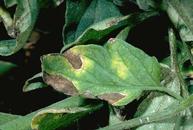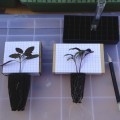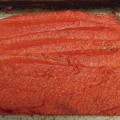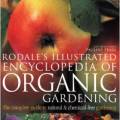Whole Plant
Plant has poor vigor and reduced yields
- Root knot nematode (foliage will also yellow and turn brown from the bottom up; may also look wilted
Leaves
Yellowing of lower leaves between veins (veins remain green)
- magnesium deficiency (could be caused by overwatering, which locks up the magnesium in the soil)
Irregular yellow blotches on tomato leaves
-
Powdery mildew – dry type from Leveillula taurica
Leaves yellowish and slightly curled
- some leaves and fruit have shiny spots, others may appear blackened; clouds of small white insects fly up when plant is moved; tiny oval yellowish-green scale-like bodies are fastened to the leaf underside = Whiteflies
Powdery white spots on top side of leaves
- Powdery mildew – humid type from Oidium lycopersicum
Bronze or oily brown-colored lower leaves (and stems) gradually moving higher on plant
- Lower leaves dry and drop from the plant; extreme cases leaves fall off – Tomato Russet Mite
Leaf veins turn purple and bronze, leaves curl upward and feel thick & leathery or brittle
- Curly top virus
- some tomato varieties naturally roll their leaves upward even when they are healthy
Purple leaves
- Phosphorous deficiency
Leaves curling downward
- look on the underside of the leaves; colonies of small green to pinkish insects (or black) = aphids
- Aphids are not a problem unless very heavily infested – which can stunt the plant
- Also, honeydew from the aphids can be annoying, especially if black sooty mold grows from the honeydew
Stem/Trunk
Flowers
Fruit
- cracking = irregular water & heat
- sunscald = irregular water & heat
- matchstick tomatoes
- blotchy ripening = low potassium availablity
- bitter tasting tomatoes
- Tomatoes receiving standard nutrition (100%) were compared with enhanced nutrition (150%). The enhanced nutrition treatment was found to have a significant positive effect on tomato quality, color, and acceptability (Better Crops)
- low potassium:
- caused by not enough present, too much water or a pH drop (low pH inhibits potassium uptake)
- K is the essential element for tomato to produce sugar
- of all of the essential elements, soil K content most affects the total acid content in the fruit (flavor) (Better Crops)
- low sulfur
- low boron
- low sodium
- not enough sunlight (too much shade) –
- Sunlight has the most profound effect of all of the environmental factors on tomato sugar concentration (Better Crops)
- cool temperatures may also unsweeten fruit





